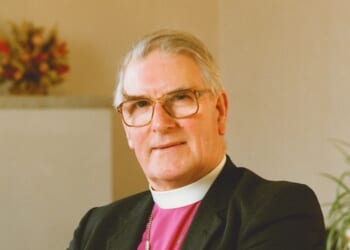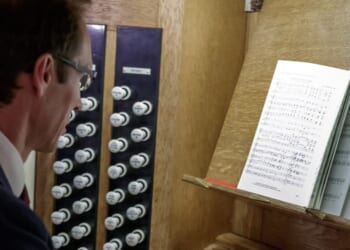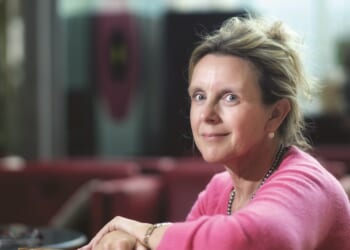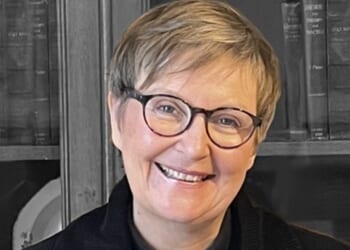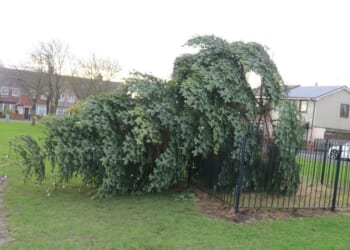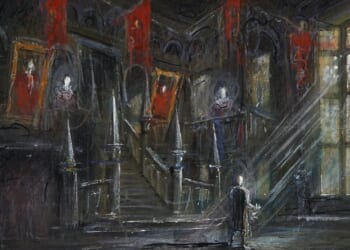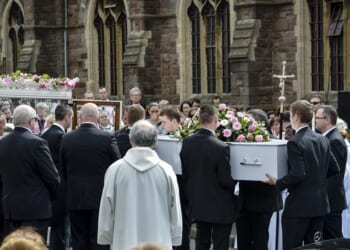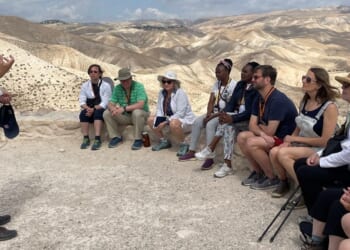Translation of the Bishop of London to Canterbury
From Canon Julian Hollywell
Madam, — I am a member of the General Synod, where the Bishop of London has a quality that is much in need in our bishops at present, which is a sort of relatable kindness.
I have been interviewed by Bishop Mullally (it didn’t go well), but, none the less, I had a sense of someone who, for however long she was with me, was curious, genuine, and, most importantly, honest and connected.
I am surprised that more has not been made of her training. Bishop Mullally is not a product of Oxbridge and Cuddesdon, nor even Ridley, Staggers, or Cranmer, but a training scheme; so she is, I think, genuinely missing those cultural traps of establishment which still infect the Church.
I’m part of that great body of Anglican priests — male, white, fifty-something, the pale, male, and stale of the Church — wondering what I’m going to do for the next 15 years. Bishop Mullally’s election has given me hope: that there is a place for intelligent and inclusive catholicity; plus hope for my parish and its people, whom I love, and for the refugees I meet week by week.
Given the appalling state of our public political culture, with a Government and an Opposition pathetically running to the mindless Right, I think the Mullally Lambeth may well bring about an unforeseen miracle: a restoration of unconditional, contagious, and humble love at the heart of our society.
JULIAN HOLLYWELL
St Werburgh’s Vicarage,
Gascoigne Drive, Spondon,
Derby DE21 7GL
From the Revd Peter Crumpler
Madam, — The Rt Revd Sarah Mullally will, it seems, become the first Archbishop of Canterbury to have served as a self-supporting minister (SSM), combining ordained parish ministry with paid employment in the Health Service. The C of E’s around 3000 SSMs should feel seen and affirmed, as well as the countless volunteers that make up the vast majority of the Church’s workforce.
PETER CRUMPLER
4 Belsize Close
St Albans AL4 9YD
From Canon Jim Mynors
Madam, — Back in the 1990s, the regional courses (like the one in East Anglia which I helped to lead) were sometimes suspected of being soft options for second-rate ordinands. Thankfully, their products have established a much better reputation since. But to have a future Archbishop who trained with the South East Institute for Theological Education should be a real encouragement to those of us who have long wanted the value of this form of training to be fully recognised.
JIM MYNORS
4 Malthouse Paddock, Buckland
Oxfordshire SN7 8RH
From Dr R. W. Dyson
Madam, — The appointment of a female Archbishop of Canterbury puts the final nail in the coffin of any hope that the Roman Catholic Church might recognise Anglican orders. To those of us who have long nurtured the hope of reunion with Rome, it is a disaster. Why the Church should have chosen a course that can only injure her relations with Rome and that will obviously entail other mischievous consequences is far from clear.
R. W. DYSON
57 Grange Road
Durham DH1 1AQ
From the Revd Margaret Mascall
Madam, — I do so very much hope and pray that the identity of our Archbishop of Canterbury-designate may inspire — and I use that word deliberately — a fresh and deep reflection on both the meaning and discernment of vocation to ordained ministry, on the part of those who find it impossible to recognise that women may be found to be thus called. May we be truly one in faith.
MARGARET MASCALL
48 Holmside Avenue
Sheerness ME12 3EY
From Canon Mark Bratton and five others
Madam, — On behalf of LGB Christians, we wish to congratulate the Rt Revd Sarah Mullally on her appointment as Archbishop-elect of Canterbury. We pray for her as she prepares to assume this demanding office and to shepherd a Church seeking both unity and truth.
We hope that, under her leadership, the Church will engage more rigorously with the contested questions around gender-identity ideology. There are pressing safeguarding concerns in churches and schools, where “social transition” of children who express gender confusion has been shown to make it significantly less likely that they will desist during puberty, with lifelong consequences.
There is also growing evidence that some young people encouraged towards transition may in fact be gay, lesbian or bisexual, raising the risk that they are diverted from discovering their sexual orientation.
At the same time, proposed “conversion-therapy” legislation, if drafted too broadly, may inhibit doctors, psychotherapists, and pastoral workers from exercising responsible judgement or even from gently exploring whether a child’s stated trans identity is stable, or whether transition is truly in their best interests.
Finally, theologically, we must ask whether the idea of being “born in the wrong body” can be squared with Christian teaching about creation, incarnation, and the goodness of the body as God’s gift. These are not abstract debates, but questions of truth, justice, and compassion for vulnerable young people.
We thank and commend Bishop Mullally for leading the Living in Love and Faith process in General Synod with good grace and a commitment to progress. We trust that she will lead the Church of England in addressing the issues outlined above with clarity, courage, and a commitment to both safeguarding and the integrity of Christian doctrine.
MARK BRATTON, NIKKI BEKKER, MARK CHATER, SARAH RUTHERFORD, LORENZO FERNADEZ-SMAL, SARAH MAPSTONE, and TONY GREEN
LGB Christians
27 Old Gloucester Street
London WC1N 3AX
From Mr Lester May
Madam, — As a former Chief Nursing Officer for England, Bishop Mullally has a broader hinterland, perhaps a broader understanding of England, than many of her clerical colleagues. Sources state that the Church of England has some £11 billion in assets. She will surely know that many see her Church’s continuing to benefit from public funding, for any reason, as wrong.
She might take inspiration from Pope John Paul I, who spoke of doing good deeds and charitable and merciful acts in society. What a marvellous thing it would be were the new Archbishop to offer significant financial assistance to the NHS.
She should, too, take the Church out of politics: bishops’ time on the red benches could be spent doing good work in sees.
LESTER MAY
24 Reachview Close
London NW1 0TY
Church of England responses to the Gaza crisis
From Dr Jonathan Chaplin
Madam, — Xavier Abu Eid’s article “Recognition is only a first step” (Comment, 26 September) and Patrick Watt’s “What is at stake in Gaza” (Comment, 3 October) are the most powerful and truthful pieces on the question which I can recall in the Church Times.
Mr Abu Eid challenges the Church of England to throw its weight much more fully and boldly behind the Palestinian cause — urging, for example, that the General Synod acknowledge that genocide has occurred in Gaza.
While a handful of individual bishops over the past year have issued increasingly robust statements, even the May 2025 statement from the House of Bishops fails to denounce with sufficient clarify and force Israel’s sustained and egregious practice of war crimes, apartheid, ethnic cleansing, and — as now confirmed by an independent UN commission — genocide.
The decision of the Synod’s business managers in July 2025 to defer a discussion of a forceful motion from Carlisle’s diocesan synod on Palestine (subsequently endorsed by Sheffield’s) sends exactly the wrong signal. Kairos-Palestine called this decision “a profound moral and spiritual failure”, and even the Bishop of Gloucester described it as “shocking”.
The House of Bishops did not even have the courtesy to reply to a motion carried by Ely diocesan synod in March 2024 calling on it to issue a much stronger statement on Gaza.
The Church cannot pretend to be courageously confronting the reality that Mr Watt describes, or responding with integrity to Abu Eid’s call for greater solidarity with Palestinians, if it continues to drag its feet in these ways. It would at least be a heartening small step if all members of the House or College of Bishops would add their own signatures to the statement issued by five bishops on 30 July. We are watching.
JONATHAN CHAPLIN
19 Coles Lane, Oakington
Cambridge CB24 3AF
Intention of the climate-theology research project
From the Revd Professor Peter Scott
Madam, — Please allow me to address a misunderstanding that has arisen in responses to the news item on the Religion, Theology and Climate Change research (News, 5 September; Letters, 12 and 19 September, 3 October). The task of this research is to explore theological change against the horizon of a warming climate. Respondents were asked to consider a broad diversity of options in ecotheology as one way of tracking continuity and change. Our approach is investigative rather than stipulative.
The transition into the Anthropocene will involve cultural change — as well as other forms of change. Theology is not immune to these pressures. If Christianity is a cultural phenomenon of the Holocene, what changes might it undergo in the transition to the Anthropocene, and are changes in ecotheology already recording that shift?
The point of the research is to track the change. We seek to learn from ecotheological trends whether they might assist the Church in its pastoral, homiletic and theological responsibilities as we enter uncharted (and rising!) waters.
PETER SCOTT
Department of Religions and Theology
The University of Manchester
Manchester M13 9PL
Clergy terms of service: Lincoln diocese praised
From the Revd Peter Turnbull
Madam, — I write as a heretical union representative for the faith branch of Unite, representing clergy and lay employees. I am a heretic because I am writing to praise management and, in this particular instance, the diocese of Lincoln. Lincoln diocese seems to be light years ahead of the rest of the Church of England in offering clergy posts with 36 hours’ uninterrupted rest and a quiet day per week: way beyond last year’s suggestion from the General Synod, which seems to have been fossilised into a committee in London until the next Ice Age emerges.
Congratulations to Lincoln for improving clergy terms and conditions in a brush-stroke. If we are not careful, our growing number of union members will all go to Lincoln diocese, as our campaigns for improved stipend, pensions, housing, and retirement provision will have been listened to and acted upon, leaving recruitment a headache for the rest of the bishops and dioceses of the Church of England.
PETER TURNBULL
Chair of the Church of England and Employees Association (CEECA), Faith Workers Branch, Unite the Union
3 The Moor, Carlton
Bedford MK43 7JR
Commissioners’ impact fund and Lord Biggar
From Mr Jonathan Baird
Madam, — Lord Harries is to be applauded for his astute and incisive review of Nigel Biggar’s Reparations: Slavery and the tyranny of imaginary guilt (Books, 3 October).
In discussing Lord Biggar’s targets, he writes: “One is the Church Commissioners, who have set aside £100 million to support communities affected by slavery; and he accuses the Commissioners of a failure of due diligence.”
Lord Harries also might have enquired why a charity with the statutory purposes of the Church Commissioners is pursuing a course that has been so authoritatively contested by eminent historians and is potentially divisive.
All 33 Church Commissioners, including the seven parliamentarians, will, I hope read the book and consider this question. They have no excuse for not so doing, as I have given a copy of Lord Biggar’s tome to each and every one of them.
JONATHAN BAIRD
General Synod representative, diocese of Salisbury
Flint Cottage, Conock
Wiltshire SN10 3QQ
The Editor reserves the right to edit letters




